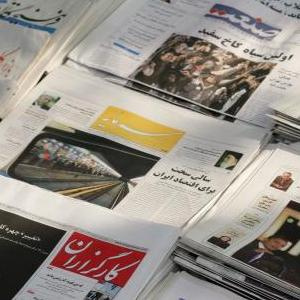Tehran's Daily Newspaper Review

In their interview with Iran, members of Iran’s and Tehran's chambers of commerce –who had met the Supreme Leader the day before- said that cynical remarks about the country’s economic situation stem from shunning reality and a lack of knowledge. Iran's front page today was dedicated to rosy news about domestic developments; from development of new methods by a scientific research center to treat incurable diseases with stem cells, to a report on “champions no one hails for”, i.e, technicians working on drill platforms in the Persian Gulf, to doubled capacity for PhD applicants at public universities.
Jomhouri-ye Eslami focused on domestic and international politics on its front page. The top headline was “US and Russia sold out Yemen and Libya dictators”. As usual, the newspaper also served as a mouthpiece for Hashemi Rafsanjani, who stated, “reinforcing the private sector will solve many domestic problems”. Speaker of the parliament Ali Larijani used the metaphor “monsoon rains” to refer to the recent upheavals in Iranian politics, adding that they “should not cause deviation from the Islamic Republic’s ideals”. Not so optimistic as the government’s newspaper, Jomhouri-e Eslami also reported that the first oil consignment failed to sell in the newly established energy stock market.
As the “geriatric” Bandar bin Sultan’s health is deteriorating, Kayhan spoke of “escalating war of power to replace the Saudi crown prince”. Meanwhile “Washington’s fear of Shi’as empowerment” in Bahrain has compelled the White House to withdraw its Fifth Fleet from its base in this small Arab country. Kayhan also reported good news: liquid subsidies will be paid to Iranian households in two weeks time.
Basking in the near-demise of the Reformists in Iran's political apparatus and the crushing pressure on Ahmadinejad and his team, influential conservative politician and deputy speaker of the parliament Mohammad-Reza Bahonar was quoted by Resalat, saying that “Leaders of the Fetneh and the “Astray current” cannot attend the political stage due to their measures outside the Constitution and the harms they inflicted upon the Nezam”. He also asked the technocrat pro-Rafsanjani parties Kargozaran and E’tedal va Tos’eh to “delineate with Fetneh”. In its front page analysis, Resalat also stated that “electoral [participation] preconditions”, mentioned by Khatami and some other Reformist figures during recent weeks, is “the codename for Reformists’ new project”, just as “vote-rigging was the Fetneh-perpetrators codename for anarchy after the presidential election, according to Mohammad-Ali Abtahi”.
Shargh reported of the “Final Step in the Kahrizak case”. According to Principlist MP Parviz Sorouri, member of Majles’ national committee, three years after the death of four post-election detainees in the notorious detention center, the case has been thoroughly investigated by the judicial apparatus and the only measure not yet taken concerns Said Mortazavi, former arbiter and current deputy of Ahmadinejad who had ordered the move of detainees to Kahrizak, a correctional center designated for dangerous criminals. The newspaper also cited the Supreme Leader’s representative in the Revolutionary Guards, Ali Saidi, as saying that “people have the right to choose, but not every choice is right”. Ahmadinejad's legal advisor Fatemeh Bodaghi also said that recent arrests of officials were not “coordinated” with the government.
Amid the heated debate over Hejab and a re-launch of the Moral Security initiative by police forces across the country, Tehran mayor Mohammad-Baqer Qalibaf also commented on the issue, saying that “Hejab and decency are not temporary concerns” in the inauguration ceremony of Iran's largest Shahrbanu complex –women-only recreational spaces embedded in parks- in Tehran. Tehran-e Emrooz also reported rumors of the possible resignation of vice president Mohammad-Reza Rahimi, who is losing his positions one by one in favor of Esfandiar Rahim Mashaei’s right hand man Hamid Baqaei, after Baqaei moved to the presidential office as Ahmadinejad's executive deputy.
* Note: Vatan-e Emrooz does not publish on Thursdays.
Trouble with understanding some terms? Check our Glossary of Iranian Political Terms.
Briefing
Hamshahri (Citizen) is the official daily newspaper of Tehran's Municipality. Its general directions in politics, culture and economy are determined by the mayor of Tehran, currently Mohammad Baqer Qalibaf.
Iran is the official organ of the administration.
Jomhouri-ye Eslami (The Islamic Republic) was known as the official organ of the Party of the Islamic Republic, founded in 1979 and disbanded in 1987. Currently, it is an open critique of Mahmoud Ahmadinejad's policies and is known to be a mouthpiece of Akbar Hashemi Rafsanjani.
Kayhan (Universe) is a hard-line conservative newspaper. Its editor-in-chief –currently Hossein Shari’atmadari- is appointed by Iran's Supreme Leader. Shari’atmadari’s editorials often spark off controversy and debate inside Iranian political circles.
Khabar (News) is a principlist daily newspaper which adopts a critical stance towards Ahmadinejad's policies.
Resalat (Mission) belongs to the moderate wing of the principlist camp. Resalat’s best known analyst is Amir Mohebbian, its political editor.
Shargh (East) is a moderate reformist newspaper. It was the most popular and influential reformist newspaper in its first period of publication which lasted from August 2003 until September 2006.
Tehran-e Emrooz (Tehran Today) is a ‘principlist reformist’ newspaper, connected to Mohammad Baqer Qalibaf.

